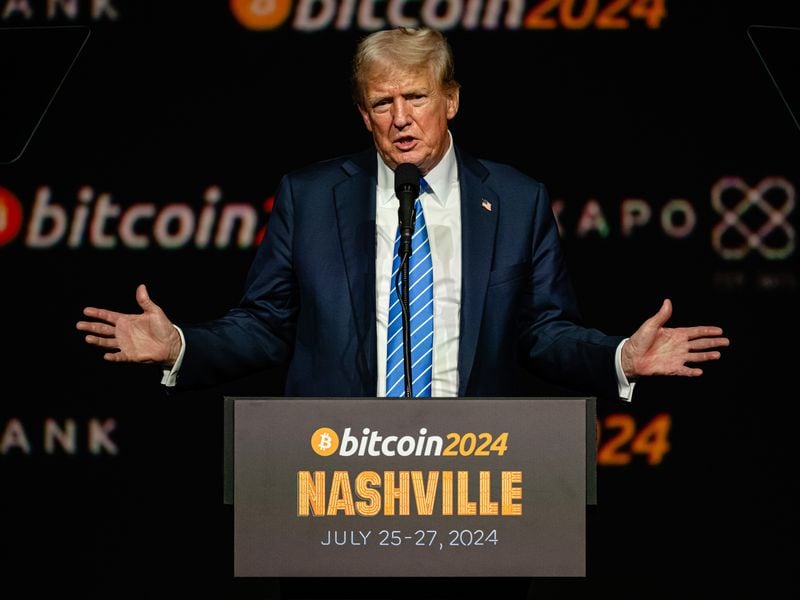The piece, “Harris and Trump Shouldn’t Pander to the Crypto Crowd,” argues that our presidential candidates are too craven to the crypto industry and the many dollars it’s donating this cycle (Public Citizen, a campaign spending watchdog, reported this week that crypto companies were behind half of all corporate election spending this year). “The good news is that business interests are getting support during an election year. The bad news is that the business is crypto,” the op-ed begins.
It then reminds readers that one Sam Bankman-Fried (him of the FTX imbroglio) once “lavished cash on candidates in hopes of laxer regulations” and argues that crypto is now engaged in a similar sort of exercise. It cautions candidates against “abandon[ing] common sense in pursuit of cash.”
First of all, nobody should argue against “common sense.” The phrase runs all the way back to 1776 when one of America’s greatest sons uttered it for a great cause. Second, we can all agree that campaign contributions are inherently problematic: they sometimes cause candidates to do weird, partial things against the wider public interest. Many of us can agree that the tail-effects of Citizens United, which argued for unlimited corporate political spending on free speech grounds, are troublesome. It leads to a corrupted form of democracy where vigorous public debate doesn’t normatively lead to policy in the widest interest.
So far, so good. But Bloomberg isn’t really arguing against lobbying and election spending. Its editorial begins with that line about it being good that business interests are supported. The trouble is in how Bloomer makes its case.
Let’s run through the rhetorical flourishes below:
“… the stakes aren’t especially high.”
Bloomberg says the U.S. isn’t planning to ban bitcoin (like China or Chad), so what’s the problem, right? Well, thank our lucky stars that we’re not like Afghanistan! We are still free to use a form of money that’s not controlled by a government because our government hasn’t said it’s not OK. Yipee! By this logic, we should also be glad we’re not with China-Chad on issues like free speech, an independent judiciary and media, and freedom of association.
But maybe the stakes are higher than Bloomberg thinks? Money is already digital and, because of crypto, it’s becoming increasingly programmable. That allows the wider capital markets, which Bloomberg covers with alacrity, to operate in more efficient, open and transparent ways. Crypto isn’t just Bitcoin (though BTC still accounts for roughly half the total market cap); there are thousands of other flowers in this garden, from stablecoins to tokenized real-world assets. And crypto isn’t just about assets; more fundamentally, it’s a technology with hundreds of use-cases. More to the point: other modern, free and forward-thinking countries are embracing this technology while the United States still argues over basic facts.
In the 15 or so years since Bitcoin was invented, digital tokens have proved to be of essentially no practical value.
This sort of statement is easy to make, and exhausting to counter. But let’s take a short stab and say that crypto has made a lot of people rich and employed many more gainfully (including many journalists we know at Bloomerberg). Stablecoins (market cap: $177,090,363,336) allow thousands of law-abiding folks to move money cheaply and effectively peer-to-peer and across borders, avoiding the onerous fees charged by traditional remittance companies. Bitcoin has often failed as a payment mechanism, as Bloomer says, but it’s often proved an effective store-of-value (over the long term, even if it whipsaws day-to-day), which is partly why the SEC approved ETFs for Bitcoin (and Ethereum) and why people in soft money-nations like Nigeria and Argentina look to it as a hard money-alternative. I could go on and on and on. But it’s a Friday in late August and dreaming of the beach is preferable to responding to sweeping statements that lack all form of nuance or fidelity to truth. You can insert your own positive crypto use-cases here____________________.
Policymakers [shouldn’t] be encouraging people to park their savings in digital wallets instead of stocks, bonds and other assets that support the real economy.
I mean, first of all, politicians aren’t investment advisers and their words shouldn’t be treated as investment advice. But what does this “real economy” mean? Is a government bond part of the real economy, if that money is going to pay off debt from government spending during, say, Covid? Is that real? Is investing in Coca-Cola or Raytheon, investing in the real economy? Or are we really just investing in sugary drinks and missiles that do a lot more harm to kids than Ethereum does? Did mortgage-backed securities, pumped by a cocktail of explicit and implicit government guarantees and regulatory subsidies, “support the real economy” in the early 2000s? Isn’t a real “real economy” one that supports individuals and families to live the lives they want, and doesn’t crypto do that quite ably?
I could go on, but the beach …
Finally, Bloomer seeks some middle ground. “Candidates should promise to work with Congress and regulators to ensure that the rules applied to cryptocurrencies are consistent with existing laws on fraud, money laundering and sanctions enforcement,” it says.
Agreed. The trouble with this is that Congress and regulators really haven’t been working seriously to establish “rules applied to cryptocurrencies [that] are consistent with existing laws on fraud, money laundering and sanctions enforcement.” That’s the whole reason why the crypto industry is spending heavily this cycle! Because it wants to get something done and it’s tired of waiting.
Ever since SBF was found to be SBF, the focus has all been about stopping crypto from being bad. We’ve seen endless SEC enforcement actions against crypto companies, and endless moralizing from politicians and media high-priests. But we’ve seen precious little action. The problem is simple, and every single person in the U.S. crypto industry knows it: We still don’t know what is legally permissible (and not) when it comes to digital assets. And, no, existing laws are not enough when many were written before Joe Biden was even born.
So, to recap. Thanks to Bloomberg for stirring us from our summer slumbers. Thanks to Bloomberg for drawing attention to the dangers of campaign spending. But, really, this editorial does no favors to the facts and the truth.
Note: The views expressed in this column are those of the author and do not necessarily reflect those of CoinDesk, Inc. or its owners and affiliates.

![[Action required] Your RSS.app Trial has Expired.](https://8v.com/info/wp-content/uploads/2026/01/rss-app-cfAqZL-75x75.png)




![[Action required] Your RSS.app Trial has Expired.](https://8v.com/info/wp-content/uploads/2026/01/rss-app-cfAqZL-350x250.png)










